Dakota Fanning, Daniel Bruhl and Luke Evans talk of the relevance of ‘The Alienist’ during these times
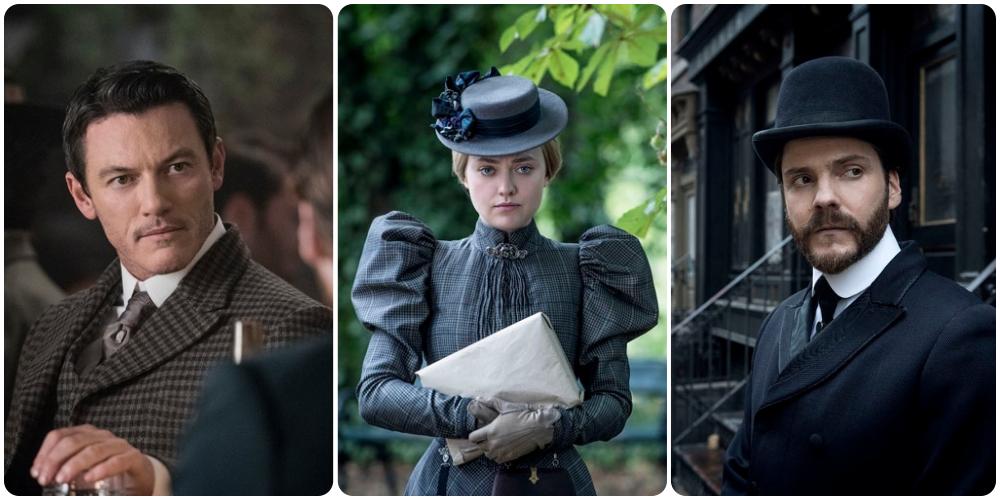
Los Angeles — When we visited the set of “The Alienist: Angel of Darkness” in Budapest, Hungary last year, we were blown away by the passion and detail that was poured on the set as well as the costumes of the actors.
The period drama TV series is based on the 1994 novel of the same name by Caleb Carr is set in the mid-1890s New York City and deals with corruption, sexism, racism, anti-immigration, crime and violence — pretty much what we are still dealing with these days in the 21st century.
As Dakota Fanning, who is portraying Sara Howard, told us in a recent virtual interview in Los Angeles, “A lot of things are relevant if you watch the show. You can see and will be struck by the parallels. There is also the fight for women’s rights, injustice, and anti-immigration in this series. It shows young people that a lot of things have not changed. There are still the same conversations going on. It is what it is. The only way to change our future is by examining our past and through television and the movies, we are not only entertained and have a suspenseful mystery but we are still able to ask the hard questions.”
We spoke with Daniel Bruhl (Dr. Laszlo Kreizler) and Luke Evans (John Schuyler Moore) and below are excerpts from our conversations with the three stars of the show. The second season of the series premiered last July 16.
Dakota Fanning
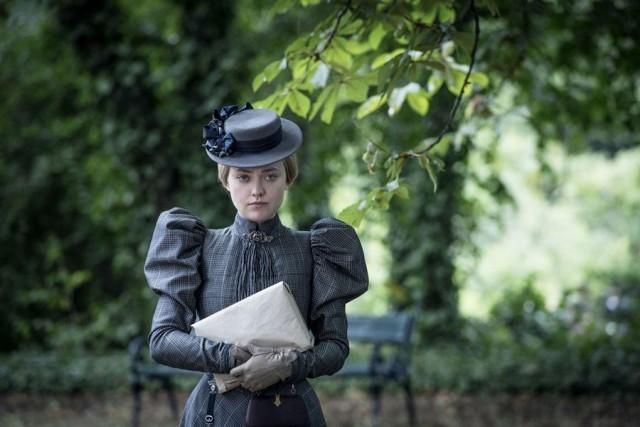
What is fascinating about this season are the steps that women are taking to be independent in their jobs. Your character is starting this agency but nobody wants to hire her. Can you talk a little bit about how important this reflection is?
I think that's been the most interesting thing about “The Alienist” and now “The Angel of Darkness” are, the similarities to things that we are seeing in the world right now; a lot of the conversations with women and women in the workplace and women's rights and all that.
In “The Alienist,” you see Sara being the first woman to hold a position in the New York Police Department and then here, you see her with her own detective agency which was definitely unheard of. And you also see the way in which Luke and Daniel's characters view her differently from the beginning when she's an equal from the start.
She's no longer having to prove herself to her own team which I think was a change and seemed sort of an evolution in that and you see her have her mentees that are working at her agency seeing this sort of example that she's setting for other young women during this time.
We still see that now with female-owned businesses and the importance of female mentors to younger women. What I also love about this show in general is mixing the real historical figures in with the fictional aspects to seeing Elizabeth Cady Stanton and the Suffragette movement and getting that sprinkled in throughout the series is really something that I've always enjoyed getting to see the real characters.
In which way do you feel your character is more conflicted and more troubled than previously?
As much as she's very secure in what she wants to do, I think that this isn't being kept a total secret. I don't think that things are completely over between John and Sara, so there's that aspect of confliction for her.
I think that she's also facing tougher challenges and much higher stakes this time around because being the owner of the detective agency, being the lead detective on these cases even though she's confident, she still has fear inside her that she's going to mess it up somehow or not fulfil her commitments so the stakes are a bit higher for her.
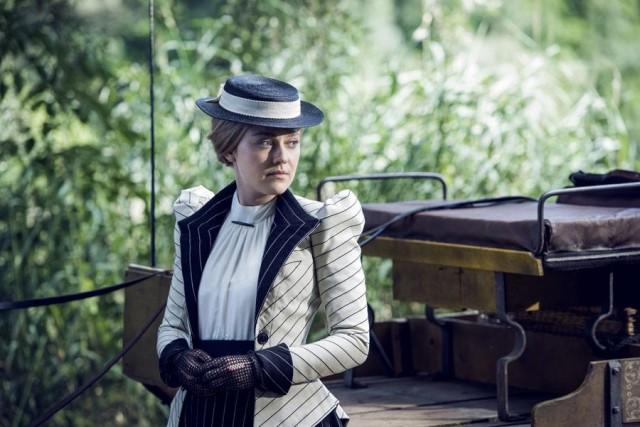
She has a little bit more to lose and also what's shown a little bit more in this new season is, Sara has to present herself to the world in a way to be taken seriously. She has to be strong, be tough, be aggressive and be unafraid and she is still a young woman who is vulnerable and has emotions and feelings of confliction about could she marry and have a child or what's the right thing to do.
I think that you just see that a little bit more because the stakes are a bit higher this time around and she's older and a little bit wiser. I think definitely the same for Laszlo and John that there's more to lose and more to gain in this new season. So, yeah, inevitably there's more confusion for them which, again, was interesting to get to continue on and see how they can grow and develop as characters was fun.
How is your life these days during the lockdown?
I'm very lucky that I am healthy and my family and close friends are all healthy so I'm very grateful for that. You can go on walks and sort of get outdoors in a safe way so I've been taking advantage of that while keeping my distance from others and doing all the precautions.
I think it's been a time of reflection and being a little bit more still which we don't all get to do. I wish it wasn't because others were potentially ill but I've just been trying to keep focused on being safe and staying healthy and keeping my family and friends healthy.
Hopefully we will one day be through this and it will be a memory of a time that we went through. So that's just what I've been doing. Trying not to get too far ahead of myself and stay in a little bit.
Talk about the costumes in the show, your relationship to fashion and how it changed during the time of coronavirus.
For the show, something that was important was to continue Sara's journey through the flow so she wears in “The Alienist” I wore culottes one time. You saw me walk up the stairs and it looked like a skirt but they were actually pants.
This time around, I wear those almost all of the time and I think it's simply because in this new role as a detective, Sara has to move a bit more and be a little more agile and also, again, another small act of rebellion to sort of make people around her slightly uncomfortable and a lot of the jackets are a little like armor, they're for protection.
She's going into a battle every day and so that really comes through the clothes. As far as now when I'm at home, I fluctuate between being comfortable and also sometimes just wanting to put a little make-up on and put on a summer dress and have a little bit of that normalcy, but I haven't thought about it too terribly much I have to say. Whatever the day brings I just follow suit.
What is it like to have a sister like Elle in the same business?
Elle and I are very different in a lot of ways. At our core, though we're very similar. We're sisters so, we do share a little piece of our brain in a way; of how we think about things and how we approach things.
Having a sibling who grew up in the same house, with the same circumstances is everything, I couldn't imagine living life without her to back me up or set me straight or just provide that unconscious understanding as siblings can provide. So, yeah, I'm beyond grateful to have her for many, many reasons.
Daniel Bruhl
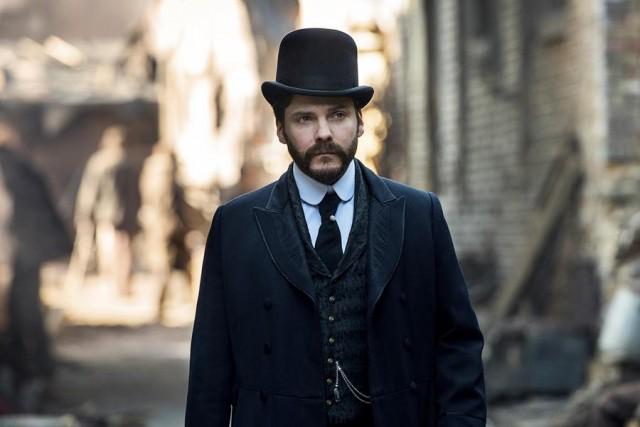
What was it about “The Alienist” that made you want to do it?
I had been looking for TV for quite some time, because the quality of television has changed quite massively. And that started quite some time ago.
I remember watching shows like “West Wing” and then “Sopranos” and ‘Breaking Bad” and all these wonderful shows in the last couple of years. So I was waiting to get an offer for something interesting and then “The Alienist” came along and that was the perfect show for me.
I was reading the book, and I was hoping to get this part desperately. It’s one of these books that is so fascinating and mesmerizing that you cannot put it away. I felt like a 12-year-old under the blanket with the torchlight. And I loved everything about it.
Of course the gripping crime thriller elements to it, but also the richness in portraying New York at the time, 1896, the fact that it’s dealing with the beginning of all different sciences like psychology and forensics, etc. made it so interesting for me.
I met Jakob Verbruggen the director, and normally they let you suffer for a couple of weeks and I am used to that and it’s horrible when you are always waiting for the phone call. And then sometimes you have to do another audition and another audition, and then eventually they tell you, oh it was great, but they have given the part to someone else.
In that case, after a couple of days I got the call and I was offered the part and I was so enthusiastic about it. And my wife even moreso. I am married to a psychologist, so it became a family thing and my wife was as nervous as me. It's been a wonderful experience because what I guess we as actors are longing for is the luxury of time and that is what makes a TV show so interesting.
So if you have such a great character, and to be able to play such a long arc and explore a character to the core, is so fascinating. Sometimes in movies you feel a bit restricted, because you have the pressure of getting to a certain point; it’s 10:30 and there’s only a couple of minutes left.
So to have the privilege of 10 hours is wonderful. Also not having to thin down such rich material as the book of “The Alienist” and to thin it down and to lose so many wonderful moments and squeeze it all into 90 minutes, but to have that long period of time.
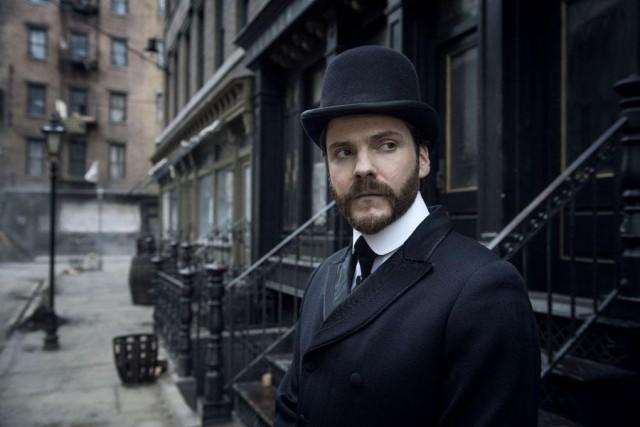
What did you learn along the way delving into that period in psychology?
First of all, the term “the alienist” was used in the 19th Century for psychologists. People with mental diseases were supposed to be alienated from themselves, so specialists who dealt with these diseases were therefore called “alienists.” Later on, the term “psychologist” was used.
The first office and psychology itself, being considered a true science only started shortly prior to the time we are dealing with the book. So in the 1870s, I think in Germany, the first proper psychologist’s office opened its doors.
Before that, it was just seen as a branch of philosophy and early alienists were fighting a lot of obstacles and had many enemies. There were a lot of prejudices towards that science, because people were afraid to look inside themselves and afraid of what they might find. So there were a lot of religious beliefs and fear when it came to exploring the human mind and psyche.
It was very interesting as a reference to read about the famous psychologists in Vienna. So as preparation, I read a lot about Freud and Brower and Yung, and got many interesting inspirations for my portrayal of Kreizler because I saw some similarities in the character, especially of Freud and Kreizler.
And then yes, I learned a lot, again, thanks to my wife, she put me in touch with other psychologists and criminal psychologists and I even went and saw a psychologist because I had never been to therapy, so I wanted to see how it feels like.
It was a bit of an awkward situation, because I told the psychologist in Hungary that I was there to observe her asking me questions so it wasn’t real therapy. That was a bit odd, but my main goal was to see how a professional psychologist talks to a patient and also gets information about the differences and how it was back in the days.
And for example, nowadays psychologists do introspective therapy, which means that they themselves have to go and see a shrink every now and then, to cope with the pressures of their job and also to stay sane and healthy and look inside themselves, as well.
But they didn’t have that back in the time and that is what is so interesting in the show. There are many wonderful scenes in which my character gets very nervous when I am all of a sudden questioned. So I am very good at analyzing everyone else around me and I think I know everything about everybody else. But when it comes to me, he struggles. And he’s having a hard time to express his feelings and to talk about the demons that are haunting himself, so that was very interesting.
How was it filming in Budapest?
Going back to the phone call, the initial phone call that I had with my agents, my plan was to move to New York, because my wife, and we are still planning to do so, she wants to do a post doc at NYU, as a psychologist. So I couldn’t believe my luck, to be offered a show about a psychologist set in New York and having the plan with my family to move to New York. And reading the book, I was certain of course that we would shoot in New York. And so after the enthusiasm of you got the part, the last note was, oh by the way, it’s not in New York, it’s in Budapest. And I thought ooo, that’s weird.
I was a bit puzzled but when I arrived in Budapest, after a couple of minutes, when I was walking around the city center, it made total sense, because there is so much preserved grand architecture of the time that we needed, especially in portraying upper class New York. I was blown away. I could not think of any other city, except maybe Vienna, which has as much wonderful architecture of the time.
And then Luke and I went to see the back lot and that was absolutely incredible. We were walking down Mulberry Street 1896 and we got goose bumps, because we thought this was incredible what they achieved. It looked so incredibly authentic. And that is just a joy I have to say.
I come from movies when I was younger, period films where the pages say you have a sweeping build and 500 extras and 50 carriages and all that. And then you arrive on the day and there is one carriage and one house and three extras and one house being built. And then you are supposed to recreate the magic of the time and it just doesn’t work. So to be able to time travel and to be surrounded by that period and every detail, every prop, every piece of clothing and the extras being handpicked and having the same quality in the clothing and make-up and everything, this is very rare. So that made it very easy for us to believe that we are living in the 19th Century. And we all became fans of shooting in Budapest.
The only thing we had to deal with was the weather because it became extremely hot and being covered in layers and layers and furry coats and hats. But other than that, it was just wonderful.
Luke Evans
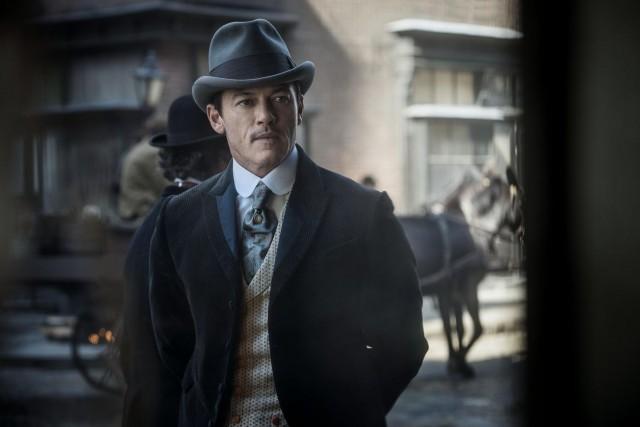
Where are you sheltering and how are you doing?
I’m in London. I live in London. I’m doing good, I’m doing really good. I spent the last three months in Florida. I was staying in a house on the beach and I tried just to enjoy the downtime because as you know, our business came to a very quick stop in the middle of March.
And I had plenty to read and I had lots of time to think and enjoy the lack of responsibility, which is very rare in this business. So I quite enjoyed the time off. There were lots of things going on. I had lots of conversations and we had other project and stuff like that.
There were lots of people who usually would be too busy with productions and stuff like that, if they weren’t on set they were at home and were able to develop mental conversations about things and conversations. It’s been really enjoyable. I tried to embrace the positive and also not to forget about the negative and the tragedy that has encompassed everybody around the world. But it’s been a time I will never forget, that’s for sure.
Which was harder to shoot this season or the last season?
The first season was very enjoyable because you’re creating the character and we had such a wonderful time in Budapest and we worked very well together and we’re all friends. So that was also a very nice experience.
Coming back for the second season was also a really exciting prospect, we really liked the scripts that we were given, we were excited about being back in Budapest, excited about working with each other once again and also developing the character.
I wouldn’t say one was more difficult than the other. This season obviously we have two episodes left so it’s an eight episode season, which was actually quite interesting because it made our storyline nice and compact and we made sure that the journey was very clear. It was really enjoyable. Time flew by quickly.
They say art imitates life. And that is the whole concept with your character and freedom of the press — how they are trying to suppress the press, not give them information, what they could do to try to manipulate, maneuver, which obviously we’re seeing right now. So just going through this experience, what kind of insight has it given you to where the press should have access?
We're very aware of the topical conversation that was being had on screen with these characters about how press can be manipulated and how you can make someone look very bad in the press. And the media, how much control even in the early part of the last century. The press was a powerful entity and people would listen to it and if you gave the wrong information in the right way, people would listen and believe it.
It was an interesting concept for a storyline, basically a hundred years ago. So that was an interesting experience. And then obviously we’ve all heard the famous phrase fake news and all of those things that you hear coming from people in politics and it’s been interesting to play that story in a fictional way but also to see how topical it was and how interesting it is to where we are right now and how the media can control so much.
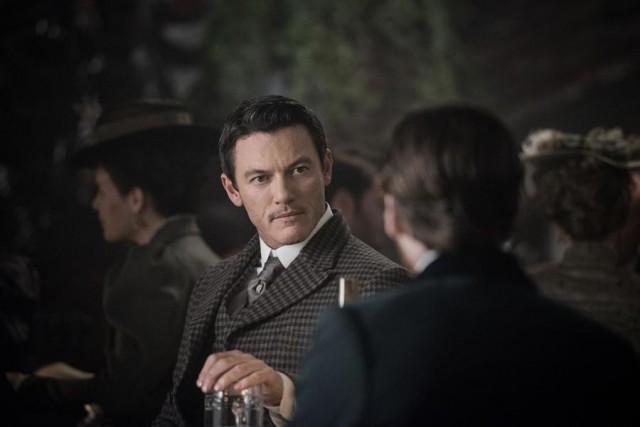
How do you imagine you would go back to work? What would you be willing to do or not willing to do in terms of having to be quarantined in one place?
I’ve signed up for four projects during this lockdown because a lot of workers, we’ve been able to do and reading lots of scripts and developing interesting content with creatives and writers.
The next project I’ll be doing hasn’t been announced yet but basically I will be flying to a different continent in about three weeks’ time and I will be going into quarantine for two weeks with the cast and crew before we’re allowed out.
We’ll be monitored and checked, as we should be if we go to a different county. It’s not the States, it’s not Europe. But we will be going to a different country and that’s how we will have to start.
Before we do anything we will be on our own for two weeks in our hotel rooms being checked and monitored by health officials from that country until we’re all cleared. And then we can go and start shooting this project that we are doing. So that’s going to take a little longer so that’s why we’re all flying out much earlier than we would have than if we were just going there to start shooting.
You portray a guy who is covering for the New York Times. So if you were a reporter for the New York Times today, what would you write?
It would be very difficult to write about anything other than the pandemic and what people are going through. I think as myself I’m always interested in the human opinion and the human interaction, the human experience, so I would probably be interested in speaking to people who have been through this COVID-19 pandemic and come out the other side. And find inspirational stories and try not to dwell too much on the negative.
I certainly would probably avoid political journalism, as I think there’s enough of that on TV in America and in the papers. I would try and make people smile and try and be positive in what right now has been a very difficult time for everybody with so much death and loss of life, and my god, everything else that’s happened since in the last several weeks.
There’s no way you can avoid talking about it and then certainly as a journalist you certainly would use your platform to highlight the problems and the issues and use your platform as a journalist to inspire people to do better and do the right thing, use the causes that they can be part of. — LA, GMA News




